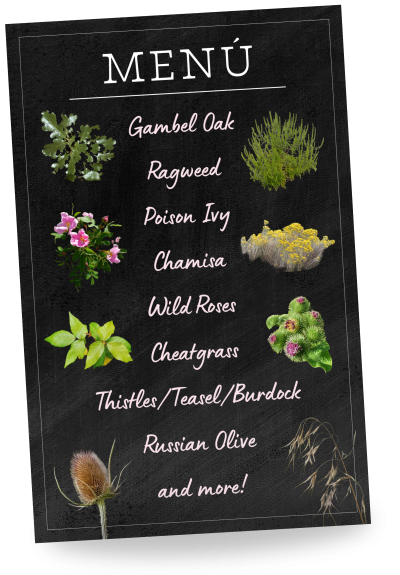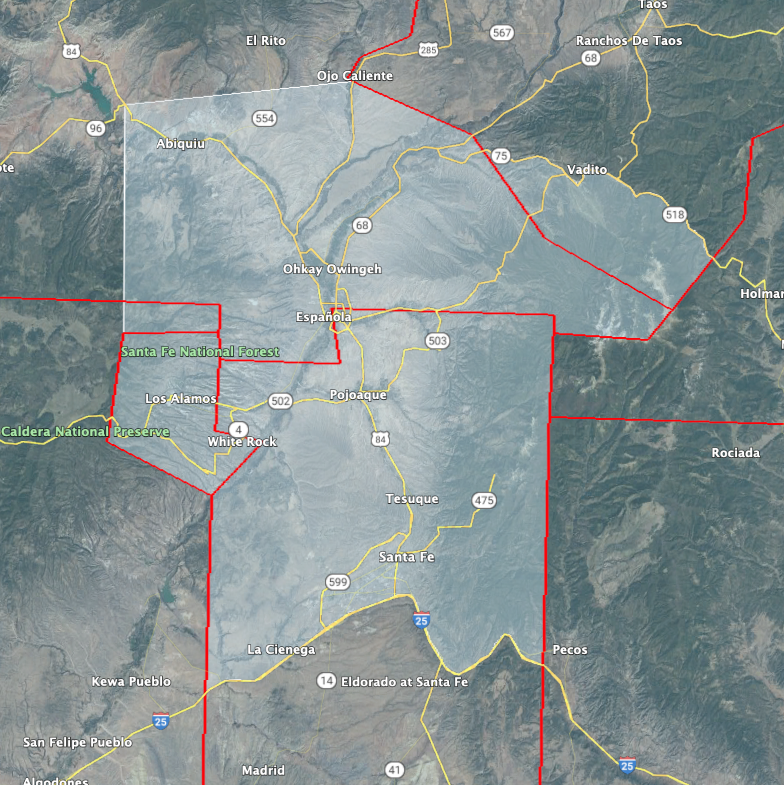What is targeted grazing and how does it work?
Targeted grazing is the application of a specific kind of livestock at a determined season, duration, and intensity to accomplish defined vegetation or landscape goals. It is also known as “conservation grazing,” or “prescribed grazing.” The controlled and monitored nature of targeted grazing separates it from the over-grazing that has, ironically, acquired a reputation for environmental damage in some parts of the world.
Here’s how it works: We start by walking your property to understand your goals and the vegetation you want to target. Together, we create a plan to address the vegetation at the most effective stage of its life cycle. When the time comes, we set up portable fencing, transport the goats, and deploy them as planned. You just sit back and enjoy the show!
Using a rotational “mob grazing” style, the goats are moved every day or two to new sections of your site. We routinely perform health and safety checks, refill supplies, and monitor progress towards the plan. When goals have been met, we’d prefer to move on as early in the morning as you will let us, to spare the goats morning traffic and hot, stuffy air on their next journey.
What will the goats eat?
Our goats are not specifically trained to eat certain plants and avoid others, but it’s fortunate that many goat favorites are nuisance or invasive species, and the foundation of the wildfire fuel ladder. They include:

Goats also eat grass, but if brush, small trees, or weeds are available, grass will make up a relatively small portion of their diets.
Importantly, goats cannot remove Tree-of-Heaven, because that plant regrows rapidly from the stump or lateral roots if cut or disturbed.
What does it cost?
It’s difficult to provide a hard and fast dollar figure until we do a (free, no-obligation) visit to your property. We do have a minimum charge equal to one acre of grazing, so think of $1,200 as a base rate.
Rates vary based on the distance from our home base, the density of vegetation, the ease of getting water to your site, and a few other details. Contact us using the quote link in the upper right-hand corner of this page, and you’ll be provided with a ballpark figure. If it works for you, then we’ll set up a time to meet on-site!
If you’re looking for a discount, one option to consider is what we call “flying standby.” We keep a waiting list of clients with small needs whose timing can be completely flexible, and who are OK with the herd coming on short notice. But being on the waitlist does not come with a guarantee that we will be able to make it to you in the first season, sorry!
How long does it take?
That depends on the density of vegetation and the size of the property. Once we know more about your site and your goals, we’ll be able to give you a better estimate. Projects taking more than 10 days per acre are rare, and 4-7 days per acre is more typical.
Generally, you can expect a short-duration service designed to get the job done efficiently while still giving you plenty of time to enjoy the process.
How far will you travel?
Everywhere in our territory, (see map,) and outside on a case-by-case basis. The larger the project, the farther we can travel and still keep costs in line, but it does get expensive.

Will the vegetation grow back?
The short answer is yes, vegetation will eventually grow back, just as it would if you mowed your lawn or applied herbicides. How quickly/densely it returns, and the amount of post-goat maintenance needed will depend on how the goats are applied, the season in which they are applied, and the condition of the vegetation in the area.
We will formulate a strategy that matches your goals for your property, however short- or long-term they are.
Shouldn’t you be paying me, since my property is feeding your goats?
Yes, the goats need to eat, but if we were only interested in putting weight on, we would choose a much more efficient way to do it. Goats On The Go® delivers a valuable, professional service that requires significant cost and labor.
When you hire GOTG you get an insured, conservation-minded service provider that delivers a thoughtful strategy, not just a bunch of goats.
Can I rent your herd to mow my lawn/solar farm/pasture?
Think of goats as brush busters rather than lawn mowers. They will eat grass, but they really shine on dense weeds and brush. If your lawn is hopelessly overgrown and you’d like to get a fresh start, then goats would certainly help return it to a manageable state. Most customers, though, would not be satisfied with goats as an ongoing replacement for a lawn mower.
Some applications, like orchards and solar farms, call for a sheep-specific approach. Goats love to climb things, and would eat the bark off of fruit trees, so they just aren’t a good fit for these applications.
Some of our affiliates offer this additional service under the Sheep On The Go® program, but we don’t… yet. 😉
Do goats stink? Are they noisy?
Your nose is unlikely to tell you there are goats nearby. Breeding males are smelly, and woo their special lady friends with a weird whooping sound, but they stay home on the farm.
Goats, especially the little ones, make occasional noise, but most people find their bleats to be pleasant and certainly not a nuisance. Three of the herd wear cowbells, but if the sound annoys you, we will happily remove them.
How do you keep the goats where you want them?
We use portable electric fencing and a solar-charged energizer to contain the goats. This allows us to be flexible. We can concentrate goats on small problem areas, move them from spot to spot, or let them roam whole properties.
We use plenty of cautionary signage, and ask you to give your neighbors a heads up. We can do a 15-minute meet-and-greet with a few neighborhood families if that would reduce the temptation to mess with the fence or sneak in when no one’s looking. (*Shakes head* Kids these days!) 😉
Fencing can be installed anywhere our crew of experienced hikers and climbers can access with a bundle of rolled up netting.
Do the goats stay overnight? Does anyone stay with the goats?
We’ll check on the goats regularly and carefully monitor the progress of the grazing project, but we don’t typically stay on-site constantly. The goats sleep under the stars on customers’ properties! The breed in our herd (Spanish) is known for being rugged and independent.
We do love camping though, so if you’re worried and don’t think it would be weird… We could pitch a small tent for an additional fee.
What about predators?
Goats have an extremely strong herd mentality, and lots of safety in numbers. Predators are very hesitant to attack a dense herd of dozens of horned animals. (Even the kids have “buttons!”)
We also know from sharing knowledge throughout our affiliate network that predators rarely work up the nerve to even think about attacking a herd until they’ve been stationary for a week or more. But 1) we move our goats around frequently, and 2) the fence administers a shock, dissuading aggressive predators.
(We would love to have livestock guardian dogs, but actually in this industry it’s impossible to find an insurer who will deal with the risks of putting guard dogs on land we don’t own.)
The goats are broken. They’re just sitting there, not eating anything!
Goats are a type of animal called ruminants, who have 4 stomachs! No, really!
When you work that hard on digestion, sometimes you have to take a break from munching. They are probably just chewing cud and regurgitating, like cows. These periods can last a few hours.
One of your goats has a limp/sore/sniffle. Don’t you care about their welfare?
Nothing is more important to the farm than the well-being of our animals! Occasionally goats get injured or sick just like us, but in the case of a broken ankle, for instance, there’s nothing you do for goats, like put a cast on. They just have to walk it off. And they do!
We keep these animals together because of goats’ strong herd mentality. (If we brought the gimpy girl back to the farm, she’d get depressed. Goats really want to be with their herd!)
Are your animals used for meat?
It’s up to individual Goats On The Go® affiliates whether or not we produce meat in the off-season. The ones who do offer premium quality meat that is lovingly raised and fed a diet containing local invasive and nuisance plants. What we’re saying is, we can personally see virtues in this type of ‘product.’
Our personal choice is, we will not sell meat, but what little we produce we will give to our neighbors, staff, mentors, and friends who have helped get this farm started. We do not cull lightly on this farm.
We do have a long-term dream of helping to start a program like Wyoming’s Food from the Farm + Ranch initiative here in New Mexico! We think producers (farmers and ranchers, conventional and organic alike) can do more to contribute to our state’s food insecurity crisis.
What are affiliates?
Goats On the Go® was founded in 2012 in Iowa, and grew quickly. They felt strongly that in providing this service to as large an area as they encountered demand, they would rather help many new ventures start up than employ a staff scattered around the country.
In 2016, GOTG began to develop a family of independently owned-and-operated businesses we call our ‘affiliate network.’ We receive live annual training, on-demand mentoring, and business tools, but we don’t give “corporate” a cut of our sales, and it’s nothing like a franchise. It’s more like how tow shops pay a small annual fee to be part of AAA, but day-to-day they run independent businesses.
If you’re interested in becoming one, introduce yourself! We want to help grow the network, because we have benefited from it so much. And affiliates near each other (in different parts of the country where the affiliate network is dense) sometimes work together on big projects. Goats at the Spaceport anyone!?
Can I rent your herd for yoga, film, or a flash-mob proposal, birthday party, petting zoo, etc.?
Sure, if you want to make us rich.
Truth be told, though, this herd has the temperament of a work crew, not a petting zoo. They aren’t trained to do anything sweet or entertaining, (except when the kids get the “zoomies” around sunset!)
Have a question you don’t see here? Drop a line via email!
